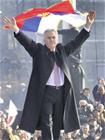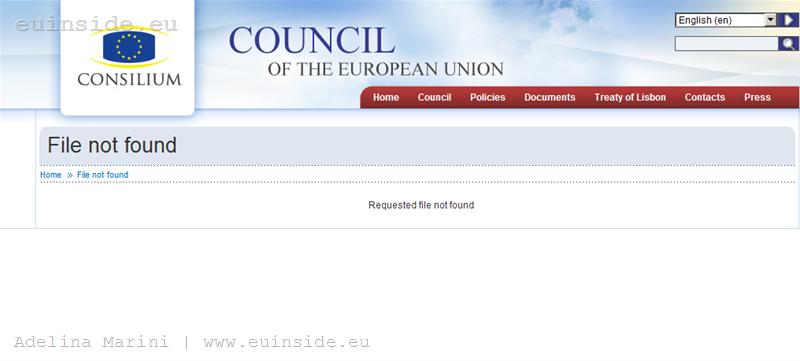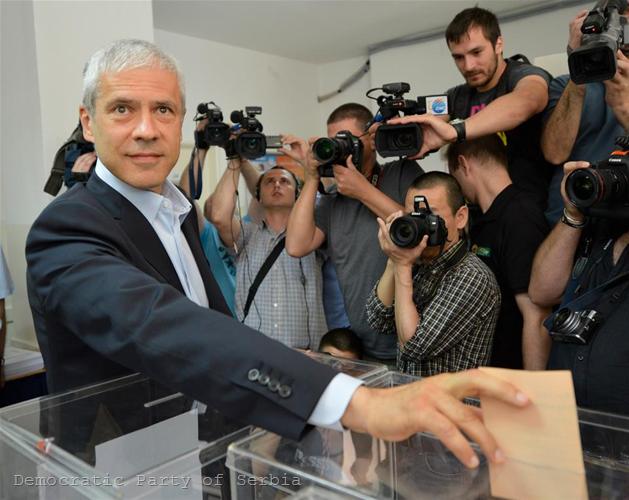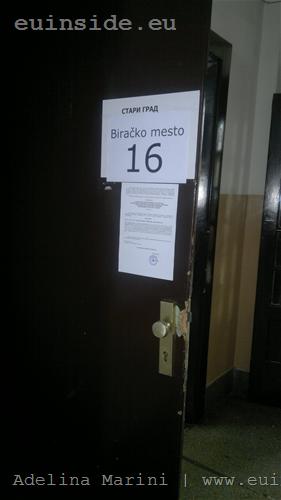The New Vidovdan for Serbia
Dessislava Dimitrova, July 1, 2012
 June 28th is a symbolic date for Serbia – starting from Vidovdan (St.Vidus Day), which marks the Kosovo battle in 1389 when king Lazar is killed and the end of the Serbian kingdom is put, going through the 1914 assassination of Franz Ferdinand, the heir to the crown of the Austro-Hungarian empire in Sarajevo, which eventually triggers the First World War, the same day in 1919 when the Treaty of Versailles is signed, which marked the end of the same war, the historical speech of former strongman Slobodan Milosevic on the same day in 1989 on the 600th anniversary of the Kosovo battle and the same date 12 years later, when he is handed over to the International crime tribunal for former Yugoslavia in the Hague.
June 28th is a symbolic date for Serbia – starting from Vidovdan (St.Vidus Day), which marks the Kosovo battle in 1389 when king Lazar is killed and the end of the Serbian kingdom is put, going through the 1914 assassination of Franz Ferdinand, the heir to the crown of the Austro-Hungarian empire in Sarajevo, which eventually triggers the First World War, the same day in 1919 when the Treaty of Versailles is signed, which marked the end of the same war, the historical speech of former strongman Slobodan Milosevic on the same day in 1989 on the 600th anniversary of the Kosovo battle and the same date 12 years later, when he is handed over to the International crime tribunal for former Yugoslavia in the Hague.
Having survived Yugoslavia’s break-up, the wars, the bombings, the battles for Kosovo, this year’s June 28th is also on the way of turning into a new historical date – almost 12 years after the fall of the Milosevic regime, his former spokesman and close ally Ivica Dacic, once nicknamed “the little Sloba”, became Serbia’s premier-designate,  receiving a mandate to form a new government not from anybody else but another Milosevic’s ally and current president of the country - Tomislav Nikolic.
receiving a mandate to form a new government not from anybody else but another Milosevic’s ally and current president of the country - Tomislav Nikolic.
“Although it is Vidovdan today [June 28], a very symbolic day, I do not want this day to be related to Serbia’s heavenly origin, I rather wish we did everything, since we cannot change the past, at least to change the present,” were the first words of the prime minister-to-be. He promised that, as a premier, he would allow Serbia to turn back to the 1990s and explained that he had accepted the president’s proposal to lead the cabinet as “the common task of numerous political parties was Serbia to be strong, to defend its national interests and to continue its EU integration path and also continue its fight against organised crime and corruption, while at the same time the citizens should live better.”
It was in the night, following the presidential and general elections on May 6 (when a president was not elected), when Ivica Dacic said that it might not be known who would Serbia’s new president be but it was clear who the new prime minister would be. Back then some analysts defined him as the real winner in those elections and not only because his party was able to achieve the best results, compared to the previous elections. It was expected that Nikolic’s Progressive party, which won most seats in Parliament, would be happy with that victory even if at the second round of the presidential elections the former president Boris Tadic was to win, and Ivica Dacic, a deputy prime minister and a minister of the interior in Tadic's Democratic Party cabinet, to hold the balance.
Quite unexpectedly, however, Tadic lost his chance to win a third term in office and shortly after the elections Dacic’s socialists agreed to work together for a new government with the Democratic party. The expectations, especially those of the West, were Tadic to become a prime minister if his party managed to strike a coalition deal, but on this Vidovdan the former president was the big loser, because after two terms in office both him and his party moved to the opposition corner. “They deserve their chance, but let us see what the result will be,” Tadic commented on the news that Ivica  Dacic had become premier-designate. He also said that from the beginning of the negotiations for a new government a major problem was who would head the government and that the Democratic Party did not want to give that seat to Dacic.
Dacic had become premier-designate. He also said that from the beginning of the negotiations for a new government a major problem was who would head the government and that the Democratic Party did not want to give that seat to Dacic.
Local analysts remained divided on what could be expected from the new government. Vladimir Goati, a political analyst, said he was surprised that the mandate was handed over to the leader of the party which won just 1/10 of the 250 seats in Parliament. Analyst Djordje Vukadinovic in his turn does not expect any major changes in the political course of the new cabinet but he forecasts additional pressure from Brussels on the Kosovo issue. His colleague, Cvijetin Milovojevic, commented that a government between the Progressive party and the Socialists would not hamper Serbia’s EU future but it would “push the brakes” every time Kosovo is mentioned. According to the economist Miroslav Prokopijevic, this lineup of cabinet would mean a “step back for Serbia” and would not make it any easier for Serbia’s people.
One of the most interesting and maybe most controversial comment came from the former central bank governor and ex-finance minister in Vojislav Kostunica's cabinet, Mladjan Dinkic, now leader of the smaller coalition partner in the new government – the United Regions party - who is expected to become finance minister. On the sidelines of the European People’s Party summit in Brussels he said that Serbia was on the brink of bankruptcy and that it needed three billion dollars only to fill its budget gap and to service its debt, and that the post that he would take was the “hottest potato”. What is interesting in this case is that Dinkic was the one to leave the government last February, led by former premier Mirko Cvetkovic, in which he served as deputy prime minister and regional development minister - an act which triggered several resignations and was one of the reasons for the cabinet reshuffle last March.
 Bakir Izetbegovic, Andrej Plenkovic | © Council of the EU
Bakir Izetbegovic, Andrej Plenkovic | © Council of the EU Aleksandar Vucic, Recep Tayyip Erdogan | © Serbian Presidency
Aleksandar Vucic, Recep Tayyip Erdogan | © Serbian Presidency Jean-Claude Juncker, Zoran Zaev | © European Commission
Jean-Claude Juncker, Zoran Zaev | © European Commission | © euinside
| © euinside | © Democratic Party of Serbia
| © Democratic Party of Serbia | © euinside
| © euinside